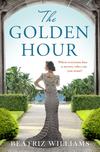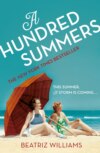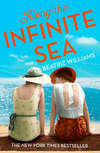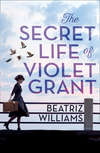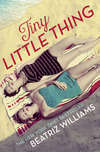Kitabı oku: «The Wicked City», sayfa 2
“Wow. Really? I didn’t see a storefront or an entrance or anything.”
“Well, that’s kind of the point, with a speakeasy. You have to know it’s there.”
Hector fastened on her face as he said this. Giving her his full, charged attention. That friendly gaze had gone narrow, more serious, and instead of pressing the necessary buttons on the dryer he just folded his arms back across his chest and waited for her to reply. And she thought—or really, the thought arrived in her head, unsolicited—Why, he isn’t young at all, is he? His eyes, they’re antiques, they were born old and tanned and heavy. Where did you come from, little old soul? Except those were Ella’s mother’s words. Tucking her into bed, leaning in to kiss her forehead. The smell of Chanel. Where did you come from, little old soul?
She realized he was expecting a reply. She wasn’t sure what to say. Was she supposed to care about the bar next door? Were the residents upset? Was there some kind of petition he wanted her to sign? This was New York; if you couldn’t stand the constant interruption of the city around you, the sirens splitting your ears and the bridge-and-tunnel crowd vomiting outside your window at three in the morning, you packed up and left for the suburbs pretty fast. So what was the deal?
She asked, “Is the noise really bad? The super didn’t say anything. I mean, I’m a pretty sound sleeper. More importantly,” she went on, trying for a lighter note, “will they give us a house discount?”
The chuckle he returned seemed a little too nervous. Broke the strange earnestness between them. He turned to the dryer and pressed his thumb on one of the buttons. It was an old model; the buttons were large and stiff and stuck down when you pushed them. There was a click, a faint buzz of electric engagement, and then the drum began to turn, bang bang bang.
“House discount,” Hector said. “That’s a good one. But sorry, no can do.”
“Bummer. What is it, some kind of secret celebrity hangout?”
“Nope. I mean, no one we would know. It’s more of a—”
The door swung open, hitting Ella in the arm, and a small, dainty girl bounded through behind an old-fashioned wicker laundry basket. Her skin was fresh and peachy, and her hair was the color of organic honey.
“Oh my God! I’m so sorry! Are you okay?”
Ella rubbed her arm. “Fine.”
“No, really. I should’ve looked first. I’m such a klutz!”
“I’m okay, really. Just leaving.”
“You’re the new girl, right?” She put her basket on her hip and stuck out her hand. “I’m Jen. Three C.”
“Hi, Jen. I’m Ella.”
Jen turned to Hector in a whip of honey hair. “Hello up there! Up to no good?”
He spread out his hands. “You know me. Sleep well?”
“All right.” She ruffled his forelock. “I heard you playing.”
“Just for you, babe.”
“Me and all the others. Wait, isn’t that machine done yet? Put my stuff on top, like, an hour ago.”
“My bad. Jumped ahead of you.”
“You what?”
“You snooze, you lose, right?”
Jen smacked him with the wicker basket. “You creep! That is like so wrong! We have a thing here in this building! Where’s the trust?”
“Ow!” Hector said, rubbing his shoulder. “All right! Mea culpa. Won’t happen again.”
Ella spoke up. “Actually, he’s covering for me. It was my laundry.”
“Your laundry?”
“But I put her up to it,” Hector said.
Jen shook her head in sorrow. “I just don’t know what to say. This is so disappointing.”
“I was just trying to be nice.”
“Look,” said Ella, “I’m sorry about the laundry. I owe you one, okay?”
“Oh, I’m not mad at you. It’s this one.” Jen jerked her thumb at Hector. “Watch out. He’s notorious. Definitely can’t be trusted with cute new tenants.”
Ella reached for the door handle. Her stomach hurt, like she’d just taken a fist. “Yeah, um. I’ll just be going now. Nice to meet you both.”
“Ella, wait—”
But Ella pretended not to hear him. Let the door close on notorious Hector and dainty Jen and the four busy washing machines and two busy dryers. The table where you folded your neighbors’ clothes and the wall separating you from some kind of weird, exclusive underground bar with no signage outside.
The mirror that said you were nobody’s cute new tenant. Just the kind of woman who couldn’t keep her husband safe in his own bed.
SATURDAY NIGHTS WERE THE WORST. You could keep yourself busy unpacking all day—and Ella did, until the last box was empty and broken down for recycling, until the last book was on the shelf and the last spoon in the drawer, and only the few pictures needed hanging—but once you opened the shrunken fridge and began to contemplate your few alluring options for dinner, you realized how much you took for granted in marriage.
Not that Ella hadn’t before found herself alone on a Saturday night. Sometimes Patrick was overseas—some Europe junket, or else paying calls on Asia—and sometimes he had client dinners. Sometimes out with the boys. (Anyway, that was the story, which she’d never doubted until now.) But these absences were infrequent enough that she actually—if she was honest with herself—relished the freedom. She might have had dinner with Joanie (at least until Joanie left for Paris) or her aunt and uncle (whom she adored) or even gone down to Washington to stay with her parents.
For the most part, though, she hung out with Patrick. Dinner, movie, TV. Sex. Usually sex. She took pride in keeping the electricity in her marriage. Her husband would never have to saw on the old chestnut that he wasn’t getting any at home now that Ella had a ring on her finger. Oh, no. She almost always said yes, even when she was tired or busy with work. Ella’s father looked eternally on her mother like she was Ginger and Mary Ann all rolled in one—Ella had caught them at it more than once, so embarrassing—and that was her model. That was the marriage she wanted to have. The kind everybody envied. She wanted the radiant, satisfied skin her mother had. The adoring gaze that followed her mother around the house.
Tonight, however, and for all the Saturday nights stretching into the imaginable future, there would be no sex. No cabernet and steak frites at the bistro around the corner. No twilight movie theater, laughing together at the same jokes, hands bumping in the popcorn. Just this half-empty fridge, this leftover baked ziti from the pizza place next to the subway stop. This TV set. These books. This studio apartment, the sprawling, affluent contents of her life compacted back into a single room, as if the past six years had never really occurred, as if they were just some play she had watched, some theme park she had visited, and now she was back in her rightful life.
This clock, ticking steadily into bedtime.
She ate the ziti and washed the dishes. She picked up a book she was supposed to read last year, for that book club she went to for a while, and poured herself a glass of wine. And another. Went to bed at eleven and stared at the dark ceiling. Somewhere in the building, somebody was playing a jazz CD, solo trumpet, Wynton Marsalis or something. Long and lonely and melancholy, rolling up and down the scale like it was reaching for something that didn’t exist.
And then she remembered. She’d left her laundry downstairs.
THE BUILDING WAS IRREDEEMABLY OLD-FASHIONED, even though the paint was fresh and the staircase sturdy, maybe because it seemed to have largely escaped any horrifying postwar renovations or—worse—ersatz period details added back later. When she’d inspected the place last week, Ella had liked that. She wanted something different from the sleek SoHo loft she had just escaped, which they had bought two years ago when Patrick got promoted to managing director and came home with his first really serious bonus, and whatever your preference for traditional design or new, you certainly couldn’t detect the handprints of some visionary, wall-demolishing architect on this place. She loved all the authentic, handmade moldings and the creaky floorboards, the quirky layout and the low-voltage lighting.
Of course, that was during the afternoon, when the winter sun had flooded softly through the old windows and turned the air gentle. Now, at nine o’clock on a Saturday night, Ella felt she was creeping downstairs through some kind of gothic novel. Or maybe that was the wine and the book—In Cold Blood, not the best choice for your lonely Saturday night—and the nocturnal melancholy of discovering your husband was having sex with other women. Or possibly the ziti, which sat unsteadily in Ella’s stomach, like it knew it wasn’t wanted.
And there was something else, something she’d noticed on her first visit. Something that had made her turn to the super and pull out her checkbook and say, I’ll take it. Something vibrant in the air, something that lived inside the walls. Her parents’ house had it. Her first apartment had had it. Her junior-year dorm had had it. The SoHo loft—gutted and cleared out and renovated to the studs from a derelict warehouse, everything old replaced by everything new—had not. Until now, turning the last corner of the stairwell, she hadn’t realized just how dead that apartment was. How she’d missed the company.
So maybe it wasn’t fear that she felt, reaching for the laundry room door. Maybe it wasn’t dread of the unknown, or of Hector’s strange warning about rats and noise from the bar and vibrating walls.
Maybe it was anticipation.
She opened the door.
ACT I
We Meet
(and it’s a doozy)
NEW YORK CITY 1924
1
THERE’S THIS joint on Christopher Street, a joint I’d know like the beat of my own heart, if I happened to have one. They used to call it the Christopher Club, and now it’s just Christopher’s. When you enter through a door in the basement of the grocery next door, you first smell the rotting vegetables and the cat piss, but never worry: all that stink clears up when the cigarettes and the liquor engulf you. And the music. The best jazz south of Ninety-Sixth Street. The bass player’s a good friend of mine. Bruno. I don’t know his last name; nobody does. We don’t deal in surnames unless absolutely necessary.
Now, I don’t inhabit the place every evening—I’m a working girl, you know, and I need my beauty sleep—but as I happen to live on the other side of said grocery, in a tiny room at the back of the fourth floor, I like to drop in from time to time, friendly-like, for a drink and a dance and a smoke and a gossip. As I’m doing now. Right there at the corner table—no, the other corner, next to the music—wearing a black dress and crimson lips and a head of strawberry hair. (The hair’s natural, the lips aren’t.) And that darling rosy-scrubbed black-and-white fellow I’m flirting with, the one who’s taken the trouble to dress like a gentleman? That’s Billy Marshall, my latest. A Princeton boy. You know the type. He’s reading me this poem he’s written in my honor—a real sweetie pie, my Billy-boy—but I’m afraid I’m not listening. A man’s just walked through the door like a prizefighter looking for a prize, the kind of fellow who demands your immediate attention. Square shoulders, bony jaw. Plain gray suit, sharp felt hat. You know the type.
The thing is, you don’t see him around a joint like this, a joint in the Village, long wooden bar and no chandelier, starving artists and starving artists’ models, queers and poets, Jews and Negroes, swank babies like Billy-boy descending southward in search of local color. We haven’t seen a gray suit around here since that stockbroker last year who lost his way back to the IRT station from a Bedford Street brothel on the down-low, if you know what I mean. Where he got the password, God knows. Anyway, this particular suit is cold sober, overcoat over his arm, nose as monochrome as the rest of him. Wouldn’t know a good time if it kissed him on the kisser and unbuttoned his starched white shirt.
Right away, I give the eyebrows to the owner, the man behind the bar—we call him Christopher, nobody knows his real name—and he gives the eyebrows right back, only more in the nature of a question mark. I flick the gaze back to the newcomer. Christopher makes this tiny nod and strolls down the bar, directly in the fellow’s line of sight, and braces two hands on the edge of the counter, like the knots of a terribly thick rope.
“Darling,” says Billy, “are you listening?”
“Of course I’m listening, sweetie. Go on.”
By now, the stranger has reached the bar, along a line right down the center of Christopher’s wingspan. He sets one foot on the rail and one elbow on the counter and he asks for something, I can’t hear what. Over the rim of his shoulder, Christopher’s eyebrows glide upward.
“You don’t like it.”
“I adore it! I think it’s awfully clever. And those rhymes. Why, you could have Bruno here set it to music.”
“It’s a sonnet, Gin, an English sonnet. Not a music-hall song.”
“You can make a lot of bread from a music-hall song.”
“Who cares about money?” He seizes my hand on the table. “I care about you, darling. I care about taking you away from all this.”
“And what if I like all this just fine? It sure beats the place I grew up in. Why, a joint like this is paradise compared to back home.”
“You’re too fine and good to be sitting here in this lousy dump. You deserve a better life, out in the country, where you don’t have to lift a finger, where you don’t have to spend eight hours a day in slavery to some lecherous banker, where you don’t have to think about anything so crass as—”
“You know something, Billy-boy? I generally find that people who say they don’t care about money are the exact same people who’ve never had to earn any.”
“You’re right. You’re quite right. And that’s what I want for—”
“Cherub,” I say kindly, returning his hand, “will you excuse me a moment? It seems my company is required at the bar.”
2
NOW, BEFORE you go forming any ill opinions of me, let me assure you I’ve never taken a cold dime from Billy the Kid. A drink or two, maybe, but no kale. I don’t allow any gentleman to pay for the privilege of my company. I’ve seen too many girls get into hot water that way, and anyway Billy’s such a dear fellow. We met several weeks ago at some uptown party or another—I think Julie Schuyler introduced us, she’s a friend of mine, if you can call it that—and he looked at me and I looked at him, and he had this lovely sheepish clean-eared handsomeness, this scrubbed jaw and pink cheek and full lower lip, this brown eye just waiting for a match to set it smoldering. Lean, straight shoulders and new skin, his shirtfront as white and flat as pure marble, his head tilted forward and his mouth cracked open, his pink tongue fumbling for a greeting. I said, Hello there, I’m Gin, and he said, I’m Billy, and I said, Pleased to meet you, Billy the Kid, emphasis on the pleased, and he just blushed into his blond, curling hair and I fell in love. I took his hand and we danced a bit, and then we went out into the cold Manhattan morning and kissed right there on the corner of Fifth Avenue and Sixty-First Street, while the frozen branches of Central Park scratched against the nearby wind, and his lips were exactly as soft and warm as I feared. Later, he asked me if my name was really Gin, and I said no, it was Geneva, but people called me Ginger because of my hair, and Ginger became Gin. His face showed relief. I guess he was afraid I might be a drunk.
3
UNLIKE BILLY—THAT tall, slender sapling, full of promise—the stranger at the bar is a live oak. Limbs thick, neck like a trunk. Ears planted on each side of his head. His shorn golden-brown hair puts me in mind of a pelt. Next to his elbow, atop the plain black overcoat, his hat contains the perfect curves of a Fifth Avenue haberdashery, the kind that charges you a mint and sends you out a gentleman. Next to his other elbow sits a glass of sweet milk, straight up.
“Evening, Gin.” Christopher nods to the stranger. “Fellow was asking for you.”
I point to the milk. “Make it two, will you?”
Christopher turns away, and I hold out my hand. “Ginger Kelly. I couldn’t help admiring your shoulders. Do you swing from trees?”
“Not since I was ten.” (Voice like a bass drum, beaten by a knotted rope.)
“Crush coconuts between your bare palms?”
“That depends on what you mean by coconuts.” He takes my hand. “Oliver Anson.”
“What a civilized-sounding name. Irish?”
“English.”
“My mistake.”
The milk lands on the counter. Christopher adds a look that asks whether I require any assistance, and I return a look that says, Keep an eye on Billy for me, will you? I lift my glass. “Cheers.”
“Cheers.”
Clink.
Drink.
The band starts a new piece, drawling, full of blues. Bruno’s bass thrums up and down. The milk is ice-cold and creamy and pure on the tongue, the taste of childhood, and as I study Anson’s face over the rim of the glass, I consider the contrast between his genteel clothes and his rocky, tanned face. His eyes, so dark a blue they are almost without color at all. I can usually take down the measure of a man at first glance—it’s a talent of mine, the way some folks can whip up a soufflé or paint someone’s face—but this one isn’t adding up. A cop doesn’t have the dough to dress like that. A gangster doesn’t have the taste. Anyway, he’s young. Not as young as Billy, but younger than I thought. The few lines on his face are new and kind of faint, as if sketched by a needle. I set down the milk.
“Tell me something, Mr. Anson. Just how did you come to know my name and whereabouts?”
“Does it matter?”
“It might. A girl making her way in the big city can’t be too careful.”
“I quite agree.”
“And you can’t trust a living soul, I’ve found. Always some do-gooder skulking around, you know, the vice patrol, looking to catch a girl out on the town for the crime of having a good time.”
“You think I’m some kind of bull?”
“Now, what kind of question is that? We’re just standing here, drinking our milk like good little boys and girls. Nothing wrong with that.”
He glances at Billy and back again. “Is he yours?”
“Maybe he is and maybe he isn’t. I don’t believe that’s any of your business.”
“I think he’s about to make it my business.”
So Billy storms up, flushed to the temples, neck pink against his white collar, and inserts himself between me and Anson. Demands to know what the devil he thinks he’s doing. They’re the exact same height, maybe six feet and a hair of the dog, but I believe Billy weighs about half as much. Anson replies to this perfectly legitimate question with the polite tolerance you might lay on a stale doughnut. Says something about having a private word with me.
“Well, you can’t have a private word with her.”
“Can’t I?”
“No. Miss Kelly has nothing to do with you, nothing at all. She’s here with me, do you understand? Minding our own business.”
“I see.” Mr. Anson finishes his milk, lays a dollar bill on the counter. Collects his hat and his overcoat. Nods to me in such a way that you could almost call it a bow. “A pleasure, Miss Kelly.”
“All mine, Mr. Anson.”
He walks away, leaving that whole dollar bill unchanged on the counter, straight up the steps and out the door, and Billy turns to me, all bright and crackly with triumph, the dear young thing.
“Well! I sure as hell showed him, didn’t I?”
4
THE POWDER room at the back of Christopher’s isn’t much to speak of, and I’ve seen a crapper or two in my time. I mean, it’s a basement of a basement. What are you going to do? There’s about enough room to swing a cat, if you’re the kind of damned brute who swings cats, and your cat belongs to a pygmy tribe. The tiles are black and white, the mirror’s chipped, the sink bears the stains of a thousand furtive cigarettes. The toilet’s liable to flush you down whole, if you’re not careful. In the corner, there’s a narrow ventilation shaft—I use the term loosely—leading to the stinking back garden of the next-door grocery, and I am presently contemplating said shaft as a means of possible escape. Not from poor Billy—whose bravery in the face of Tarzan has just about melted down the sides of that place in my chest where the heart’s supposed to lie—but from the nearby army of New York’s finest, who, I feel certain, await only a flicker of Tarzan’s eyelashes to storm the building in thunderbolts of moral righteousness.
Now, if I stand on the toilet, the pig might just fly. I’ve got the figure for it, thanks to poverty and cigarettes. On the other hand, who wants to die in a ventilation shaft?
You may be surprised to hear this, but when I first arrived on Manhattan Island two years ago, wearing my heart on my sleeve and ten additional pounds around my hips, I had never once sipped the nectar of juniper nor breathed the leaf of tobacco. It’s true! My dear mother had scraped and saved to send me to a nice Catholic school fifty miles away, and I’ll be damned if those nuns didn’t have their wicked way with me. A year of college didn’t improve matters, what with the Wagnerian dorm mother and the scarcity of men. So there I stood in the middle of Pennsylvania Station, in a hat and a sweet pink coat, clutching the tiny valise that contained my all, just like every starlet who’s ever set foot in her land of dreams, and I thought I had made a terrible mistake, that I would never belong in this sea of stink and vice, this hive of determined bees lining their cells with honey. And then I tasted the honey, honey, and I started to understand what New York City was all about. Hallelujah. I started to glimpse my place in the hive, how each tiny insect contributed her mite of pollen, how grand it was to live in a hive like this at all, even if your cell measured one inch square and lacked proper ventilation, even if you had to pawn your favorite shoes each month to pay the milkman for a quart of milk, even if—well, you get the idea. The point of Manhattan is that you occupy a cell in the hive at all. That you belong. That you have your seat at the Christopher Club bar, and that seat, if you’re clever, can propel you from a typing pool downtown to a swank party uptown to the front of a camera in a tatty Village studio, so any man with a nickel in his pocket can admire the tilt of your tits.
And I’ll be damned if I’m ready to give up my seat just yet.
I set one foot on the lid of the toilet. Brace my hand on the wall. Hoist my bones upward and upward to the hole in the ceiling, fill my lungs with the reek of sewage, and then, of course, comes the exact second the boots clamor down the hallway and the door flies open, and the powder room fills with gentlemen of blue suits and billy clubs, unamused by my predicament.

